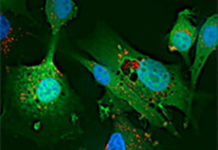No significant difference was observed in the number of immune-related adverse events (irAE) or the response following treatment with diverse immune checkpoint inhibitor (ICI) agents across several solid tumour types in patients with pre-existing autoimmune disease (AID) compared to patients without AID. These findings were presented at the ESMO Targeted Anticancer Therapies (TAT) Virtual Congress 2021 held on 1-2 March.
Grisma Patel and a team of co-investigators from the University College London Hospitals NHS Foundation Trust in London, UK examined whether patients with autoimmune disease (AID) were at increased risk of AID flare or severe irAE, as is currently hypothesised, but unverified.
They provided evidence from records of ICIs use at a UK tertiary cancer centre by comparing irAE profiles and efficacy in patients with pre-existing AID to patients without AID in a 1:3 matched cohort for tumour-type and treatment. They conducted this single centre retrospective analysis of the electronic records of patients with solid tumours who were treated with an ICI from January 2017 to December 2020.
AID was well-controlled in all patients
Of the 562 treated patients, 15 had pre-existing AID that was well controlled. In this cohort, 6 patients were not receiving AID therapy whereas 9 patients were receiving hormone replacement, or topical agents and 3 patients were on immunosuppressive therapy; of these 2 received prednisolone at <10 mg, and one patient was on mesalazine.
In the AID cohort, 5 patients had inflammatory bowel disease, 3 had psoriasis, 2 each had rheumatoid arthritis or polymyalgia rheumatica, 4 had autoimmune endocrinopathies, and one patient each had lupus or sarcoidosis. Two co-existing AID were reported in 3 patients.
Patients in both cohorts were treated for gynaecological, colorectal, head and neck, Merkel cell, urothelial, or non-small cell lung cancer.
Treatment within a clinical study was administered to 4 patients in the AID cohort and 13 in the non-AID cohort while the remaining 11 and 32 patients in the respective cohorts received treatment outside of a clinical study. The majority of patients in the AID and non-AID cohorts (9 and 27, respectively) received pembrolizumab, while other ICIs administered to patients in the respective cohorts included nivolumab (2 and 6), nivolumab plus ipilimumab (2 and 6), atezolizumab (1 and 3), and durvalumab (1 and 3).
One-fifth of patients with AID had an irAE that was possibly linked to underlying disease
With ICI treatment, 3 of the 15 patients in the AID cohort experienced an irAE that was possibly linked to their underlying AID; of these patients one each had psoriasis, rheumatoid arthritis, and colitis.
No significant differences were found between the cohort of patients with AID and the cohort of 45 matched patients without AID regarding the number of irAEs (p = 0.5691) or the number of grade 3 to 5 irAEs (p = 0.42), In the respective cohorts, 9 versus 21 patients experienced no irAEs, 5 versus 17 had one, and one versus 7 patients had 2 irAEs.
Similarly, no significant difference was observed in the best response to treatment between cohorts, (p=0.91). In the AID and non-AID cohorts, 7 versus 18 patients achieved complete or partial response, one versus 5 showed mixed response, two versus 5 showed stable disease, and 4 versus 15 patients experienced disease progression.
Conclusions
Based on the evidence from the electronic records of ICI-treated patients of a tertiary cancer centre the authors were able to conclude that, with treatment comprising several different ICIs, exacerbation of pre-existing AID was infrequent and did not result in severe toxicity.
They advised that patients with well-controlled AID could be considered for entry in clinical studies involving ICI.
This study did not receive external funding.
Reference
31P – Patel G, Sawhney P, Ohana D, et al. Safety and efficacy of immune checkpoint inhibitors in cancer patients with pre-existing autoimmune disease: A UK tertiary cancer centre experience. ESMO Targeted Anticancer Therapies (TAT) Virtual Congress (1-2 March 2021).







